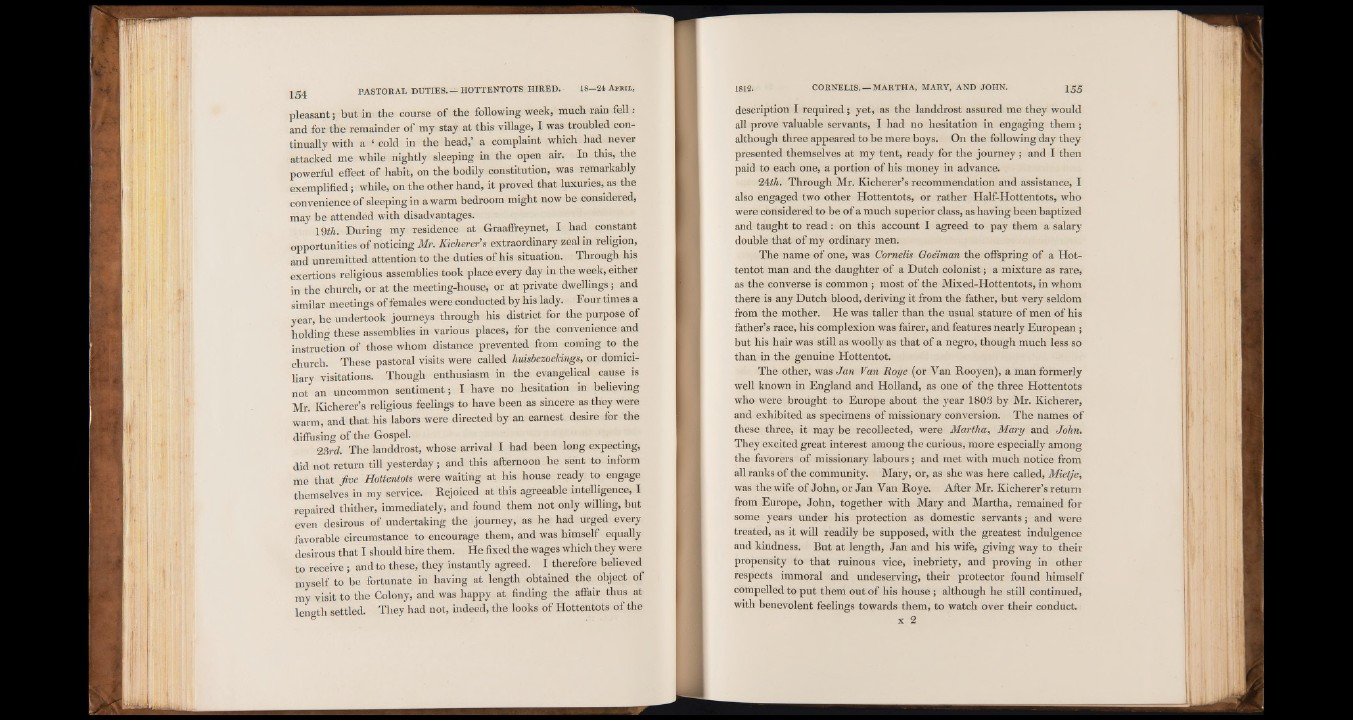
pleasant; but in the course of the following week, much rain fell :
and for the remainder of my stay at this village, I was troubled continually
with a II cold in the head,’ a complaint which had never
attacked me while nightly sleeping in the open air. In this, the
powerful effect of habit, on the bodily constitution, was remarkably
exemplified; while, on the other hand, it proved that luxuries, as the
convenience of sleeping in a warm bedroom might now be considered,
may be attended with disadvantages.
19th. During my residence at Graaffreynet, I had constant
opportunities of noticing Mr. Kicherer's extraordinary zeal in religion,
and unremitted attention to the duties of his situation. Through his
exertions religious assemblies took place every day in the week, either
in the church, or at the meeting-house, or at private dwellings ; and
similar meetings of females were conducted by his lady. Four times a
year, he undertook journeys through his district for the purpose of
holding these assemblies in various places, for the convenience and
instruction of those whom distance prevented from coming to the
church. These pastoral visits were called huisbezoekings, or domiciliary
visitations. Though enthusiasm in the evangelical cause is
not an uncommon sentiment; I have no hesitation in believing
Mr. Kicherer’s religious feelings to have been as sincere as they were
warm, and that his labors were directed by an earnest desire for the
diffusing of the Gospel.
23rd. The landdrost, whose arrival I had been long expecting,
did not return till yesterday; and this afternoon he sent to inform
me that jive Hottentots were waiting at his house ready to engage
themselves in my service. Rejoiced at this agreeable intelligence, I
repaired thither, immediately, and found them not only willing, but
even desirous of undertaking the journey, as he had urged every
favorable circumstance to encourage them, and was himself equally
desirous that I should hire them. He fixed the wages which they were
to receive; and to these, they instantly agreed. I therefore believed
myself to be fortunate in having at length obtained the object of
my visit to the Colony, and was happy at finding the affair thus at
length settled. They had not, indeed, the looks of Hottentots of the
description I required; yet, as the landdrost assured me they would
all prove valuable servants, I had no hesitation in engaging them;
although three appeared to be mere boys. On the following day they
presented themselves at my tent, ready for the journey ; and I then
paid to each one, a portion of his money in advance.
‘¡Ath. Through Mr. Kicherer’s recommendation and assistance, I
also engaged two other Hottentots, or rather Half-Hottentots, who
were considered to be of a much superior class, as having been baptized
and taught to read : on this account I agreed to pay them a salary
double that of my ordinary men.
The name of one, was Comelis Goeiman the offspring of a Hottentot
man and the daughter of a Dutch colonist; a mixture as rare,
as the converse is common ; most of the Mixed-Hottentots, in whom
there is any Dutch blood, deriving it from the father, but very seldom
from the mother. He was taller than the usual stature of men of his
father’s race, his complexion was fairer, and features nearly European ;
but his hair was still as woolly as that of a negro, though much less so
than in the genuine Hottentot.
The other, was Jan Van Roye (or Van Rooyen), a man formerly
well known in England and Holland, as one of the three Hottentots
who were brought to Europe about the year 1803 by Mr. Kicherer,
and exhibited as specimens of missionary conversion. The names of
these three, it may be recollected, were Martha, Mary and John.
They excited great interest among the curious, more especially among
the favorers of missionary labours; and met with much notice from
all ranks of the community. Mary, or, as she was here called, Mietje,
was the wife of John, or Jan Van Roye. After Mr. Kicherer’s return
from Europe, John, together with Mary and Martha, remained for
some years under his protection as domestic servants; and were
treated, as it will readily be supposed, with the greatest indulgence
and kindness. But at length, Jan and his wife, giving way to their
propensity to that ruinous vice, inebriety, and proving in other
respects immoral and undeserving, their protector found himself
compelled to put them out of his house ; although he still continued,
with benevolent feelings towards them, to watch over their conduct.
x 2